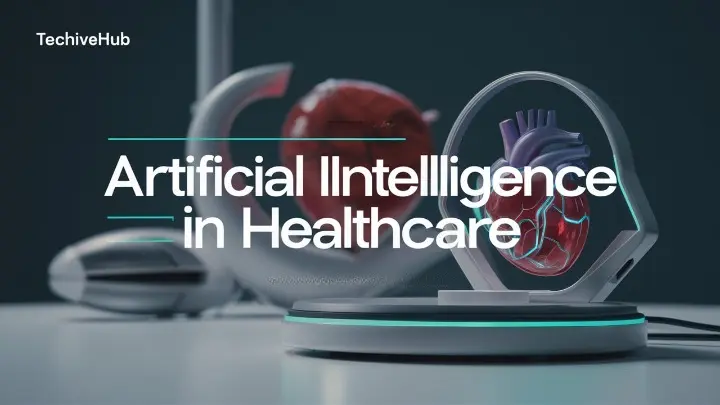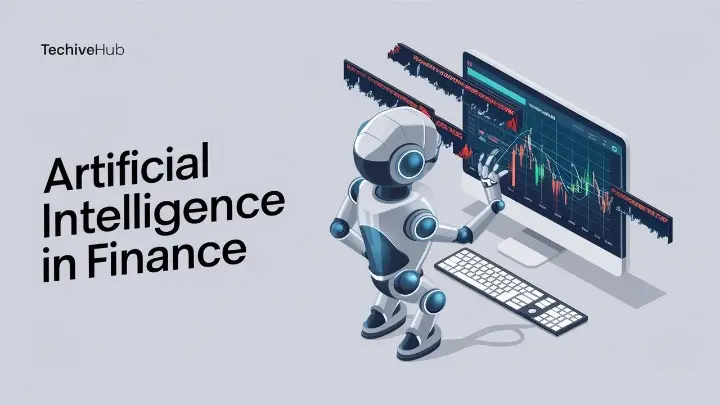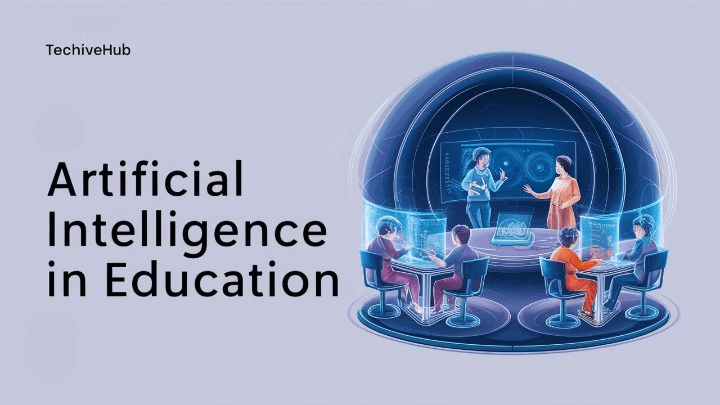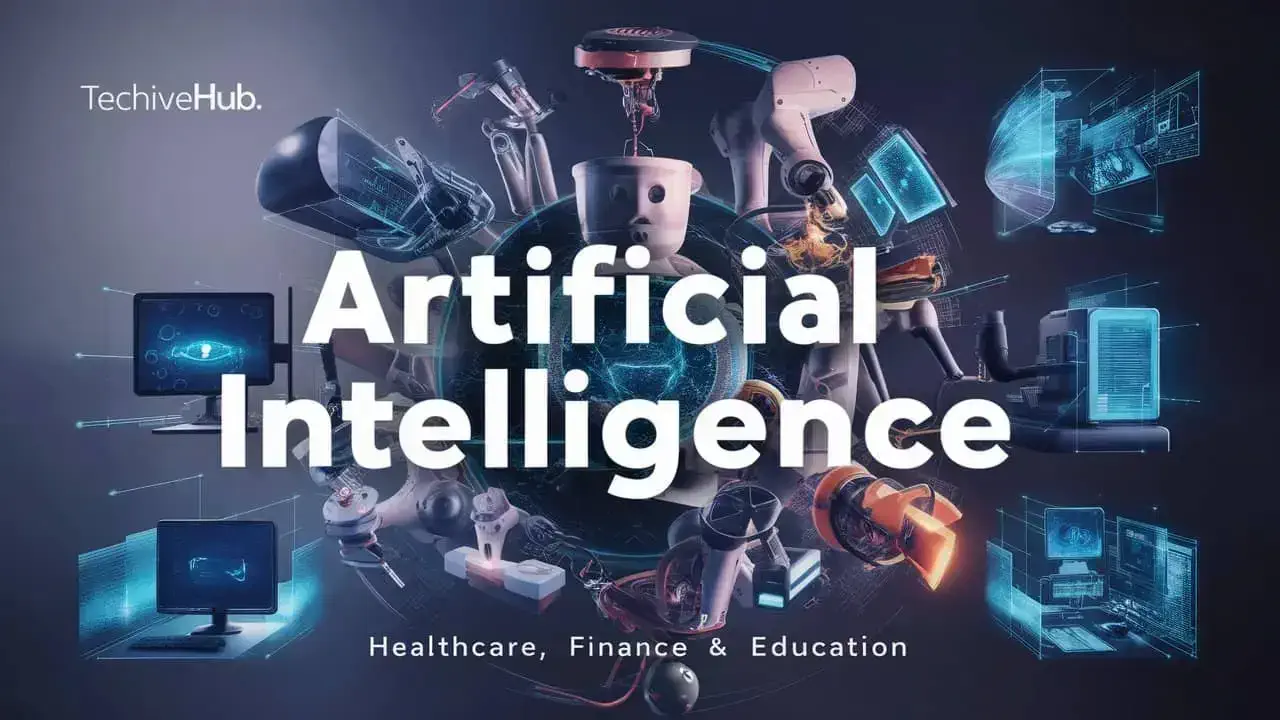Introduction
Imagine a world where a machine can detect cancer more accurately than a human doctor or where your financial portfolio is managed by an algorithm that optimizes your returns better than any financial advisor. In 2023, AI-driven diagnostics improved the accuracy of cancer detection by 30%, saving thousands of lives. This is not science fiction but the reality that artificial intelligence (AI) is creating across various sectors. AI’s transformative power is most evident in healthcare, finance, and education, where it is revolutionizing processes, enhancing efficiency, and creating better outcomes. This article explores how Artificial Intelligence is reshaping these critical areas, driving us toward a better world.
Artificial Intelligence in Healthcare

Enhancing Diagnostics and Treatment
Advancements in Medical Imaging
AI is revolutionizing medical imaging by enhancing the accuracy and speed of diagnoses. Algorithms can analyze medical images, such as X-rays, MRIs, and CT scans, to detect anomalies that might be missed by the human eye. For instance, Google’s DeepMind has developed an artificial intelligence model that can detect over 50 eye diseases as accurately as world-leading doctors. These advancements are not only improving diagnostic accuracy but also reducing the time taken to reach a diagnosis, enabling quicker treatment and better patient outcomes.
Predictive Analytics for Disease Prevention
Predictive analytics is another area where AI is making significant strides. AI models can analyze vast amounts of data to predict disease outbreaks and patient risks. For example, during the COVID-19 pandemic, AI models were used to predict hotspots, helping to allocate resources more effectively and prevent the spread of the virus. These predictive capabilities extend to chronic disease management, where AI can identify patients at risk of conditions like diabetes or heart disease, allowing for early intervention and prevention.
Streamlining Administrative Processes
Electronic Health Records (EHRs)
AI is enhancing the management and analysis of electronic health records (EHRs), improving patient care, and reducing errors. By automating the extraction and processing of data from EHRs, AI can help healthcare providers quickly access relevant patient information, leading to better-informed decisions. For instance, IBM Watson Health uses AI to analyze EHRs, providing insights that help doctors personalize treatment plans.
Automating Routine Tasks
Administrative tasks such as scheduling, billing, and patient inquiries can consume significant time and resources. AI-powered chatbots and automation tools are streamlining these processes, freeing up healthcare professionals to focus on patient care. For example, Babylon Health’s AI chatbot can handle patient inquiries, provide medical advice, and even schedule appointments, enhancing operational efficiency.
Personalized Medicine
Tailored Treatment Plans
AI’s ability to analyze individual patient data allows for the creation of personalized treatment plans. In pharmacogenomics, AI can predict how different patients will respond to medications based on their genetic makeup, enabling customized drug therapies. This approach not only improves treatment efficacy but also reduces adverse drug reactions.
Remote Monitoring and Telemedicine
Telemedicine and remote patient monitoring are becoming increasingly important, especially in the context of global health crises. Artificial Intelligence plays a crucial role in these areas by enabling continuous monitoring of patients through wearable devices and mobile apps. These tools can track vital signs and alert healthcare providers to potential issues in real time, ensuring timely intervention and improving patient outcomes.
Artificial Intelligence in Finance

Risk Management and Fraud Detection
Enhanced Fraud Detection
In the financial sector, AI is significantly improving fraud detection and prevention. Machine learning algorithms can analyze transaction data in real-time, identifying suspicious activities and flagging potential fraud. For instance, companies like PayPal use AI to monitor millions of transactions daily, identifying fraudulent patterns that would be impossible for humans to detect.
Risk Assessment
AI is also transforming risk assessment processes. By analyzing vast amounts of data, AI models can more accurately evaluate credit risks and manage financial risks. Banks and financial institutions use these models to assess loan applications, predict default risks, and make more informed lending decisions. This not only enhances the accuracy of risk assessments but also speeds up the decision-making process.
Algorithmic Trading and Investment Strategies
Algorithmic Trading
AI-powered algorithmic trading is optimizing investment strategies by analyzing market data and executing trades at speeds and efficiencies unattainable by human traders. Hedge funds and financial institutions use artificial intelligence to predict market movements, identify trading opportunities, and execute trades with precision. This approach minimizes human error and maximizes returns, providing a significant edge in the competitive financial markets.
Robo-Advisors
Robo-advisors are another innovation driven by artificial intelligence in finance. These automated platforms provide personalized financial advice and portfolio management based on individual investor profiles. By using AI algorithms, robo-advisors like Betterment and Wealthfront offer low-cost, efficient, and customized financial planning services, making expert financial advice accessible to a broader audience.
Improving Customer Experience
Personalized Financial Services
AI is enhancing customer experience in the financial sector by providing personalized services. AI chatbots and virtual assistants, such as those used by Bank of America’s Erica, can answer customer inquiries, provide financial advice, and assist with transactions. These tools offer a seamless and personalized banking experience, improving customer satisfaction and loyalty.
Streamlining Operations
Operational efficiency in financial institutions is also being improved by AI. By automating routine tasks such as customer support, data entry, and compliance checks, AI reduces operational costs and enhances service delivery. For example, JPMorgan Chase uses artificial intelligence to analyze legal documents and streamline its back-office operations, resulting in significant time and cost savings.
Artificial Intelligence in Education
Personalized Learning and Tutoring
Adaptive Learning Systems
AI is revolutionizing education by creating personalized learning experiences. Adaptive learning systems use artificial intelligence to analyze student performance data and adjust the content and pace of learning accordingly. Platforms like Coursera and Khan Academy utilize AI to provide customized learning paths, ensuring that students receive the support they need to succeed.
Intelligent Tutoring Systems

Intelligent tutoring systems offer one-on-one tutoring tailored to individual student needs. These systems use artificial intelligence to provide instant feedback, answer questions, and guide students through complex concepts. By offering personalized attention, intelligent tutoring systems help students overcome learning challenges and achieve better educational outcomes.
Enhancing Administrative Efficiency
Automating Administrative Tasks
AI is streamlining administrative tasks in educational institutions, such as scheduling, grading, and enrollment processes. Automation tools can handle these tasks more efficiently and accurately than manual processes, freeing up educators to focus on teaching and student support. For instance, AI-powered grading systems can evaluate assignments and provide feedback, reducing the workload on teachers.
Data-Driven Decision Making
Educators are increasingly relying on data analytics to make informed decisions, and AI plays a crucial role in this process. AI can analyze large datasets to identify trends, measure student performance, and evaluate the effectiveness of teaching methods. This data-driven approach enables educators to tailor their strategies to improve student outcomes and optimize resource allocation.
Expanding Access to Education
Online Learning Platforms
AI is expanding access to education through online learning platforms. Massive Open Online Courses (MOOCs) leverage AI to provide high-quality education to students worldwide. AI algorithms personalize the learning experience, recommend relevant courses, and offer interactive content, making education more accessible and engaging.
Supporting Special Education
AI is also making strides in special education by providing tailored learning plans for students with special needs. AI-powered tools can adapt lessons to suit individual learning styles and provide assistive technologies that support students with disabilities. These advancements ensure that all students have access to quality education, regardless of their learning challenges.
Conclusion
Artificial intelligence is transforming healthcare, finance, and education, driving us toward a better world. In healthcare, AI enhances diagnostics, streamlines administrative processes, and enables personalized medicine. In finance, AI improves fraud detection, optimizes trading strategies, and enhances customer experiences. In education, artificial intelligence provides personalized learning, streamlines administrative tasks, and expands access to education. As AI continues to evolve, its impact on these sectors will only grow, offering new opportunities and improving outcomes for individuals and society as a whole. Stay informed about AI developments and consider how these advancements can be leveraged in your own field to drive innovation and progress.
By understanding and leveraging artificial intelligence’s capabilities, we can look forward to a future where healthcare is more precise, finance is more secure, and education is more personalized and engaging.


1 thought on “Artificial Intelligence: Transforming Healthcare, Finance, and Education for a Better World”